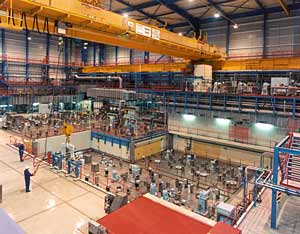
The system built to manage Russia’s nuclear legacy is crumbling, our new report shows
Our op-ed originally appeared in The Moscow Times. For more than three decades, Russia has been burdened with the remains of the Soviet ...
News

Publish date: December 12, 2002
Written by: Nils Bøhmer
Translated by: Marte-Kine Sandengen
News
After a delay of more than one year, the British Secretary of State for Environment, Food and Rural Affairs, Margaret Beckett, has granted British Nuclear Fuel Limited (BNFL) a renewed discharge permit for discharges of the radioactive substance Tc-99 from the Sellafield plant. The permit allows BNFL to discharge 90 TBq of Tc-99 annually until 2006. After 2006, discharge restrictions will be reduced to 10 TBq annually. According to the plan, the fuel tanks containing the old liquid waste causing discharges of Tc-99 must be emptied. The reason for this is that the British nuclear safety authorities do not consider the tanks safe beyond 2006.
Simultaneously, Margaret Beckett seized the opportunity to order a report – finished within four months – on the options to store solidified Tc-99 onshore by way of the so-called TPP method. If the report concludes positively to its assignment, it is Mrs Beckett’s intention to introduce a discharge prohibition of Tc-99 until the TPP method can be implemented. The report will also look into options to store Tc-99 onshore beyond 2006.
The Bellona Foundation considers the latest steps from the British government to be a deliberate adjournment strategy. First of all, British authorities have for more than one year promised to investigate different alternatives for reducing the Tc-99 discharges – but nothing has happened. Furthermore, Bellona has for a long time pointed out to the very same authorities that onshore storage of nuclear waste is technically feasible, e.g. by way of the TPP method. Thus, the British authorities have had plenty of time to evaluate the TPP method.
If the British authorities were sincere about introducing the TPP method, nothing should stop them from adjourning the Tc-99 discharges as of today, until the TPP method is thoroughly investigated. Next week, the Bellona Foundation will visit the Sellafield plant and ask BNFL to introduce a voluntary cessation of Tc-99 discharges until the TPP method is investigated further.

Our op-ed originally appeared in The Moscow Times. For more than three decades, Russia has been burdened with the remains of the Soviet ...

The United Nation’s COP30 global climate negotiations in Belém, Brazil ended this weekend with a watered-down resolution that failed to halt deforest...

For more than a week now — beginning September 23 — the Zaporizhzhia Nuclear Power Plant (ZNPP) has remained disconnected from Ukraine’s national pow...

Bellona has taken part in preparing the The World Nuclear Industry Status Report 2025 and will participate in the report’s global launch in Rome on September 22nd.